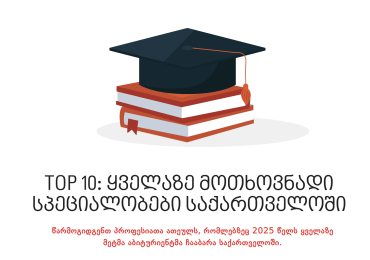Main challenge faced by enterprises while recruiting new staff is the lack of technical skills, related to specific equipment or processes, used by the enterprise (30.5%), – these are the result of labor market surveys conducted by the Ministry of Economy and Sustainable Development. Other challenges are lack of teamwork skills (16%), lack of the ability to obtain new information and skills (13.2%) and lack of calculation, reading, data and table usage skills (9.6%).
Main problem in Tbilisi is the lack of calculation, reading data/table usage skills (85%) and lack of the ability to obtain new information/skills (83%). In the rest of Georgia, the biggest problem is the lack of decision-making skills (47%) and the lack of problem solving skills (41%).
Lack of skills of the applicants by professional groups:
- Majority of specialists/professionals in the field of life sciences and healthcare (6.5% of respondents), education (2.4%) and commercial performance (3.8%) mainly have problems with teamwork skills;
- Specialists/professionals in the field of physics, mathematics and engineering (1.5%) lack ICT skills;
- Workers of individual services and security and models (2.8%), sales assistants and goods demonstrators (13.7%) lack technical skills;
- Workers of food manufacturing and related fields lack both technical skills (13.7%) and the ability to obtain new information and skills (10.7%).
- Majority of representatives of client informing sector lack calculation, reading, data/table usage and information presenting, analyzing and conveying skills (2.8%).
The survey revealed that employees are not actively involved with regard to workforce development. Namely, only 5% (4,762 enterprises) of the surveyed enterprises have participated in trainings during the last 12 months (most active in trainings have been representatives of trade (22%), professional, scientific and technical activities (14%), healthcare (10%) and transport (9%) fields). 71.3% of enterprises have themselves conducted trainings and 55% were financed by the enterprises.
















